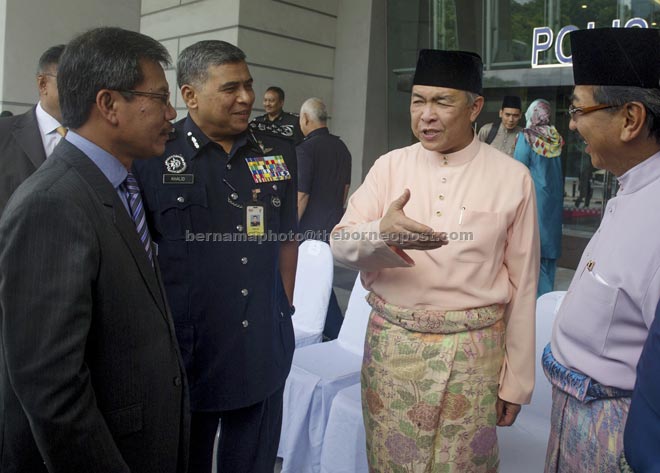
Ahmad Zahid (second right) shares a light moment with (from right) Musa Aman, Khalid and Home Ministry chief secretary Datuk Alwi Ibrahim after chairing the meeting at Bukit Aman Police headquarters. — Bernama photo
KUALA LUMPUR: Two more temporary detention centres will be built, in Tawau and Lahad Datu in Sabah, at a cost of RM50 million to accommodate the rising number of illegal immigrants in the state, said Deputy Prime Minister Datuk Seri Dr Ahmad Zahid Hamidi.
Ahmad Zahid, who is also the Home Minister, said the decision was made at the meeting of the Master Committee on Migrant Management in Sabah yesterday after fine-tuning a proposal by the Royal Commission of Inquiry on the issue of illegal immigrants in the state.
“The existing four temporary detention centres in Sabah can hold about 6,000 illegal immigrants. We will build two more, one in Tawau and the other in Lahad Datu,” he told a press conference at the Bukit Aman Police headquarters here.
Ahmad Zahid spoke after chairing a meeting of the committee.
The press conference was also attended by Sabah Chief Minister Datuk Seri Musa Aman, Inspector-General of Police Tan Sri Khalid Abu Bakar and several senior ministry and Sabah government officials.
The minister also said that among the RCI proposals taken into account was the enforcement of the biometric system or finger print identification of individuals at the 10 entry-exit points in Sabah.
Ahmad Zahid said this was to ensure that repatriated illegal immigrants were blacklisted and prevented from returning to Malaysia.
“It was to ensure that illegal immigrants do not use falsified documents or other people’s documents with changed personal particulars.
“The finger prints of the illegal immigrants at the detention centres should also be taken to ensure that after their repatriation, with the help of the missions or consuls general in Sabah, monitoring can be done to ensure that they do not return,” he said.
The master committee has 12 members, including the joint chairmen, namely the home minister and the Sabah chief minister, and meets once in three months either in Sabah or Kuala Lumpur.
Commenting on the special operation to trace and detain illegal immigrants in Sabah, Ahmad Zahid said it was going on daily.
As of yesterday, he said, about 3,000 illegal immigrants had been blacklisted, of whom 2,057 were from the Philippines, 440 from Indonesia and 517 from other countries.
The deputy prime minister said detained illegal immigrants would be given a one-way travel document to return to their country of origin.
Ahmad Zahid said it was hoped that with the aggressive measures taken by the federal government and the Sabah government, issue of phantom voters would no longer be raised to create a negative perception of the Barisan Nasional government leadership.
Commenting on Malaysia’s elevation to the Tier 2 Watch List on the 2015 Trafficking in Persons (TIP) report of the United States Department of State, he said it showed the commitment of the government in tackling the issue.
“We have taken steps which followed the checklist prepared by the US State Department. I had promised that within 18 months we would be able to fulfil the requirements.
“But we have done it in less than 18 months. Although 18 months were given as the timeline to implement, we managed to do it within only 12 months. That shows that we are efficient,” he said.
The annual report released by the US State Department listed the positions of 188 countries in their efforts to tackle human trafficking, with the categories as Tier 1, Tier 2, Tier 2 Watch List and Tier 3 Watch List.
Asked whether Malaysia could maintain its position on the list, Ahmad Zahid said he was optimistic it could.
“I believe we would be able to maintain (the ranking) because we in KDN (the Home Ministry) and in PDRM (the police) believe in not only maintaining the confidence given but would like to improvise, having our guideline as well as moving forward to improvise the system based not only on their but also our KPI (Key Performance Index),” he said. — Bernama
